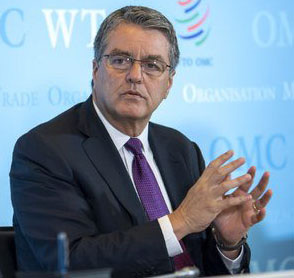Jeddah
Global trade has been hit by new and accumulated import restrictions just as economies need to rebuild in the COVID-19 crisis, the World Trade Organization (WTO) said in a mid-year report.
But some export constraints imposed on surgical masks, medicines and medical equipment early in the pandemic are being rolled back, it said. “Although the full impact of the pandemic is not yet reflected fully in trade statistics, it is expected to be very substantial,” WTO Director General Roberto Azevedo said.
The WTO said last month that estimates for the second quarter of 2020 indicated a year-on-year drop in world trade of about 18%.
Mohammed Al-Tuwaijri, the Saudi nominee for the top WTO job, has said that the organization needs to consider how best to navigate global trade and development. “Every country will have its own requirements regarding rehabilitation post-COVID-19 and under such conditions, the role of the WTO becomes of paramount importance. We will devise a line of action which benefits all member states,” Al-Tuwaijri said. “We want to do justice to all members, do justice to the organization, and do justice to international trade,” he added.
“The WTO has been practically dysfunctional and the members have been settling their disputes outside it,” Al-Tuwaijri told a group of Pakistani journalists via video link. The pandemic will exact a heavy toll on Arab countries, causing an economic contraction of 5.7% this year, pushing millions into poverty and compounding the suffering of those affected by armed conflict, a UN report said. The UN’s Economic and Social Commission for Western Asia expects some Arab economies to shrink by up to 13%, amounting to an overall loss for the region of $152 billion.
Another 14.3 million people are expected to be pushed into poverty, raising the total number to 115 million — a quarter of the total Arab population, it said. More than 55 million people in the region relied on humanitarian aid before the COVID-19 crisis, including 26 million who were forcibly displaced.
Arab countries moved quickly to contain the virus in March by imposing stay-at-home orders, restricting travel and banning large gatherings, including religious pilgrimages. But the restrictions exacted a heavy economic toll, and authorities have been forced to ease them in recent weeks.
That has led to a surge in cases in some countries, including Lebanon, Iraq and the Palestinian territories. Gulf countries were hit by the pandemic at a time of low oil prices, putting added strain on already overstretched budgets. Middle-income countries like Jordan and Egypt have seen tourism vanish overnight and a drop in remittances from citizens working abroad.
Rola Dashti, the head of the UN commission, said Arab countries need to “turn this crisis into an opportunity” and address longstanding issues, including weak public institutions, economic inequality and over-reliance on fossil fuels. “We need to invest in survival, survival of people and survival of businesses,” she said.—Arab News









